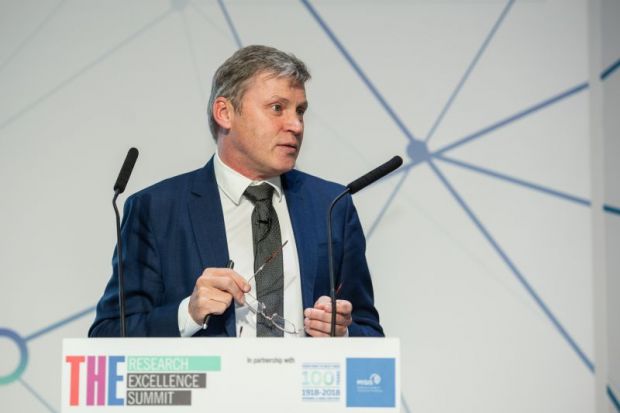The Russian government’s goal of pushing five of its universities into the top 100 of the global rankings by 2020 is “not realistic” within the given timescale and budget, the initiative’s leading architect has admitted.
Speaking to Times Higher Education at the Research Excellence Summit in Moscow, Andrei Volkov, the deputy chair of Project 5-100, said that while “great progress” had been made within the past five years, such a specific target was “impossible”.
“I don’t believe in the next couple of years that such a rapid change will happen,” he said. “It’s not possible, because it’s a time-consuming approach. It’s just not realistic.”
In the latest Times Higher Education World University Rankings – five years on from the launch of 5-100 – Russia’s highest representative, Lomonosov Moscow State University, is placed 199th. Only four institutions are in the top 400.
But Dr Volkov added that rankings are just one marker and to “win the gold Olympic medal” is “not the ultimate goal”.
“Ultimately, we are here for the long run and we will see that it happens,” he explained. “Much more important than [rankings success] is that the dynamic [in Russian higher education] is changing.”
“There is now internal ambition within universities. They see this government goal and it encourages them to make their own progress – which is much more important than the government putting in more money and pressure, and it’s a big cultural change in a small amount of time.”
During the summit at the National University of Science and Technology (MISiS), Dr Volkov shared data demonstrating that the research output of the 5-100 institutions had improved markedly during the five years of the initiative and had overtaken Brazil, Russia’s nearest competitor, in 2018.
However, 5-100 universities’ collaborations with other Russian and international institutions remain weak, as do international student numbers.
Asked whether Russia’s terse relations with the West had negatively affected academic exchange, Dr Volkov said: “Unfortunately, yes.” However, he added that “this is not something universities can [fix] themselves – it’s at a government level. At the same time, based on my knowledge the government is very supportive of improving matters.”
Just because there are tensions at the top, Dr Volkov continued, it does not indicate that there are poor relations at academic level, which he urged students to consider when thinking about Russia as a potential study destination.
“I understand, of course, that when someone from the UK or the US or Germany, for example, is looking at where to go for their studies, this not-very-good atmosphere no doubt influences their individual decision. But I don’t see any friction on a local level,” Dr Volkov said.
POSTSCRIPT:
Print headline: Russia’s top 100 rankings target is ‘not realistic’
Register to continue
Why register?
- Registration is free and only takes a moment
- Once registered, you can read 3 articles a month
- Sign up for our newsletter
Subscribe
Or subscribe for unlimited access to:
- Unlimited access to news, views, insights & reviews
- Digital editions
- Digital access to THE’s university and college rankings analysis
Already registered or a current subscriber? Login








